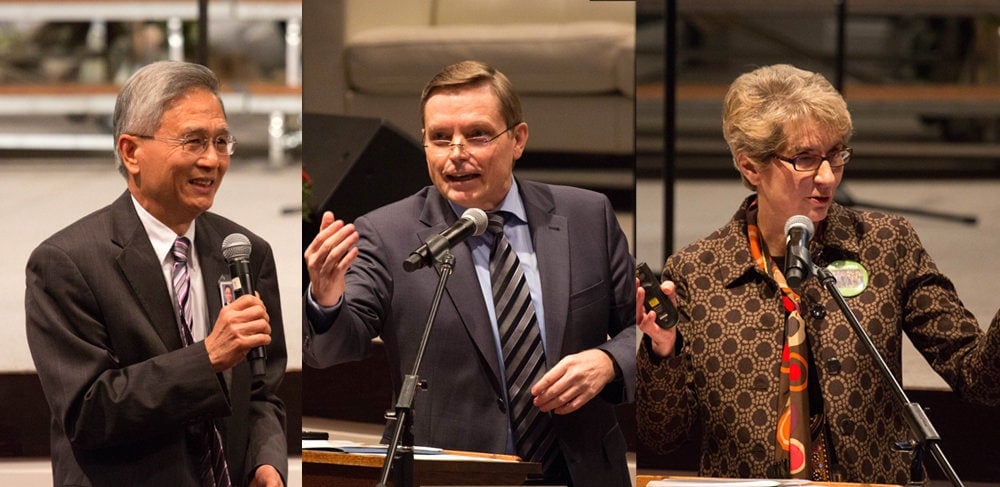
, news editor, Adventist Review
Artur A. Stele, a general vice president of the Seventh-day Adventist world church, faced something of a quandary when he first began visiting the United States years ago.
Every time he approached a group of people, he would go straight to the men and shake their hands. Women rarely received the same greeting, causing some to look confused or even offended.
The reason for his actions, Stele said, was because he was brought up in a culture where it was customary for men to shake other men’s hands but wait for women to indicate first their receptiveness to a handshake, perhaps through a facial expression or the extension of their own hands. Stele, who was raised in the former Soviet Union and served as president of the church’s Euro-Asia Division for a decade, didn’t detect many signals from American women.
Back in Russia, Guillermo E. Biaggi toppled the culture barrier quickly in 2010 when he replaced Stele as president of the Euro-Asia Division. Biaggi, an outgoing Argentine native, immediately grabbed women’s hands in a warm clasp.
“He didn’t only shake their hands but he also kissed them — and they liked it!” Stele told an audience of about 300 church leaders and laypeople, including Biaggi, on Wednesday night.
Biaggi, who was elected a general vice president of the Adventist world church at the General Conference Session in San Antonio last summer, smiled broadly as those seated in the hall roared with laughter.

Stele described his lack of cultural awareness in a keynote speech opening the weeklong Annual Council business meetings at the Adventist world church’s headquarters in Silver Spring, Maryland. He spoke at a LEAD leadership conference, which traditionally starts Annual Council and this year aims to increase the cultural sensitivities of Adventist leaders.
Read what’s on the agenda of the 2015 Annual Council
Adventists can only share the gospel if they are willing to raise their “cultural intelligence” by learning other cultures, said Cheryl Doss, director of the church’s Institute of World Mission, which organized the two-day conference titled “God’s Mosaic of Culture.”
“As you need physical exercise to get strong, you need to meet people different from you to get strong cultural intelligence,” Doss said.
For Adventists, it is particularly important to have cultural intelligence because of the global nature of the church, conference attendees heard. In fact, the respected independent Pew Research Center ranked the Adventist Church as the most racially diverse religious denomination in the United States earlier this year.
Doss showed a Reebok television commercial titled “Escape the Sofa” that illustrates how difficult it can be for people to leave their comfort zones, and she instructed attendees to find someone from a different culture to sit and converse with for small group activities during the remainder of the conference.
Cultural differences exist between countries, generations of people, and even Adventists themselves, Stele said. Among the differences between Adventists, he noted that church members in some countries like to go for a Sabbath walk on the beach as long as the water doesn’t touch their feet. Adventists in other countries don’t mind wading in the water as long as they are not swimming. Adventists elsewhere go swimming.
Adventists also don’t agree on whether it is permissible to put something on top of a Bible or the proper way to pray, Stele said. He told of a visiting Adventist pastor who put his hand in his pocket during the opening prayer in church. No one listened to his sermon afterward, Stele said.
After meeting in small groups on Thursday, attendees shared cultural values involving prayer in church. In some countries, such as the United States, it is customary to kneel for prayer. In others, such as Russia, Adventists usually stand for prayer. Some cultures frown on the idea of remaining seated for prayer. One attendee spoke of how some people close their eyes for prayer and others don’t.
Watch the 1-minute television commercial titled “Escape the Sofa” that LEAD conference organizers used to illustrate the difficulty of leaving one’s comfort zone.
Culture can also dictate theological issues, a problem that was especially apparent during Jesus’ time on Earth, said Stele, who also serves as director of the church’s Biblical Research Institute. He said the cultural understanding that the Messiah would set up an earthly kingdom was so engrained in Jesus’ disciples that their last recorded question to Jesus was whether He would now establish His kingdom.
“Jesus came, but culture dictated a wrong understanding of theology,” Stele said.
Jesus, however, broke down cultural barriers. “Though He was a Jew, Jesus mingled freely with the Samaritans,” Stele said, citing from Ellen G. White’s Ministry of Healing pages 17 to 26.
Stele said Adventists also needed to step outside their own cultures by first acknowledging that they don't know everything and then showing a willingness to learn.
Annual Council attendees showed a willingness to learn by gamely attempting to answer multiple-choice quizzes on culture administered by G.T. Ng, executive secretary of the Adventist world church, on Wednesday night and Thursday.
Attendees laughed when Ng asked: “Before entering a home in Japan, you must first A: brush your teeth; B: remove your shoes; C: put on perfume; D: all of above.”
The correct answer was B, remove your shoes.
But attendees stumbled over a question about the background of culture. Three times, they incorrectly answered the question: “Human culture is A: partly inherited genetically; B: entirely learned; C: limited to rich societies with sophisticated cultures; D: all of above.”
Ng finally declared that the correct answer was B.
“Culture is entirely learned,” Ng said.
It was a lesson that attendees were unlikely to forget soon.